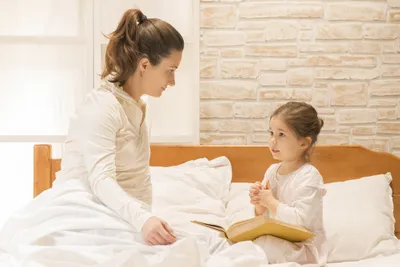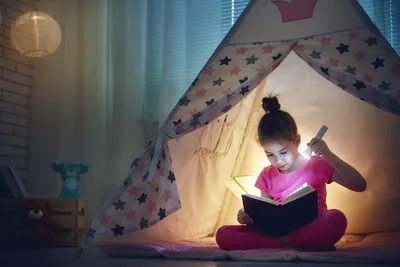Reading and literacy are important – which is why reading books has long been a popular choice to end the day before your kid (hopefully) drifts off to dreamland. However, after a long and trying day at work, sometimes reading book after book can be especially tiring.
Not only that, it’s nice to switch things up once in a while to keep the bedtime routine something to look forward to (for your child as well as you). So, let’s take a closer look at six other things you can do with your child at bedtime other than flip through the same old books to get them off to sleep…
1. Let Them Draw
Babble.com offers some tips about getting junior tired in a fun and creative way at bed (as an alternative to sitting them in front of a television). It suggests bringing a bit more color into the picture – literally.
“Coloring is a soothing activity for many kids, and a great way for them to unwind,” notes the site. It suggests having them illustrate their favorite part of the day, and if that doesn’t do the trick, have them draw what they’re looking forward to tomorrow.
2. Let Them Write
This approach is brought to you by KidSpot.com, and involves starting a “worry book” that lets your child spill out any negative feelings onto paper. It may not seem as fun as the previous suggestion, but the source says this can be comforting to a child. “Many children raise their worries and fears right at bed time,” it adds.
The source says once they have written down their worries (or you can help them if they’re not at the writing stage), you tuck the book under their pillow to sleep on. Then tell them something like, “sleeping on it will make it better in the morning”. Sounds a little far-fetched, but indications are that it works.
3. Use Gentle Exercises
Parenting.com has a list of ways to get junior to sleep, but two of them in particular involve a bit of physical exertion and relaxation techniques. One thing you can have your child do is to perform “deep pressure exercises,” which involves tightening and releasing muscles from their toes upwards.
This can be a standalone exercise, or you might also choose to add in another suggested routine, which is bedtime yoga. “Pick some child-friendly, sleep-friendly poses to wind her body down,” notes the source. You may want to consult a yogi for advice for this one, and it might also be a good opportunity for you to try some poses alongside your child.
4. Let Your Child Tell the Story
One of the things about reading books is that you’re doing most of the work while your child is listening intently, which is all fine and dandy. However, Babble.com suggests letting your child tell the story; put away the books and let them use their imagination.
Not only will this help stimulate their creativity – “let his imagination run wild!” – it may be fun and entertaining for you to hear what they come up with. And all that extra thinking about what happens next just may be the thing that tires them out.
5. Make Bedtime a Game
Parenting.com has a list of games you can play with your child, that don’t require them (or you) to break a sweat. One “game” is called the “Pajama Walk,” which involves letting your child get prepared to sleep in their PJ’s and then heading out for a wagon wide complete with blankets for fresh air and conversation.
Another variation involves shutting off all the lights in the house before bedtime, and supplying everyone with a flashlight for shadow puppets. This low-light approach can also make bathtime more relaxing, it adds. Another game called “Hide and Sleep” involves hiding their stuffed animals, toothbrush and pajamas, and having them complete each step of bedtime preparation as they find them.
6. Use Stuffed Toys to Your Advantage
Don’t underestimate the power of a stuffed animal to a toddler when it comes to bedtime routines. You can let your child tuck them in before they get into bed themselves, giving them an added sense of accomplishment (and security) as they drift off.
In fact, “A study of children who were scared at bedtime revealed that receiving a stuffed animal significantly reduced nighttime fears when compared to the group without a stuffed animal,” reveals the Huffington Post. Tell your child their stuffed animals are their friends that will protect them through the night. This technique can be applied on its own, or in tandem with the other aforementioned approaches.








